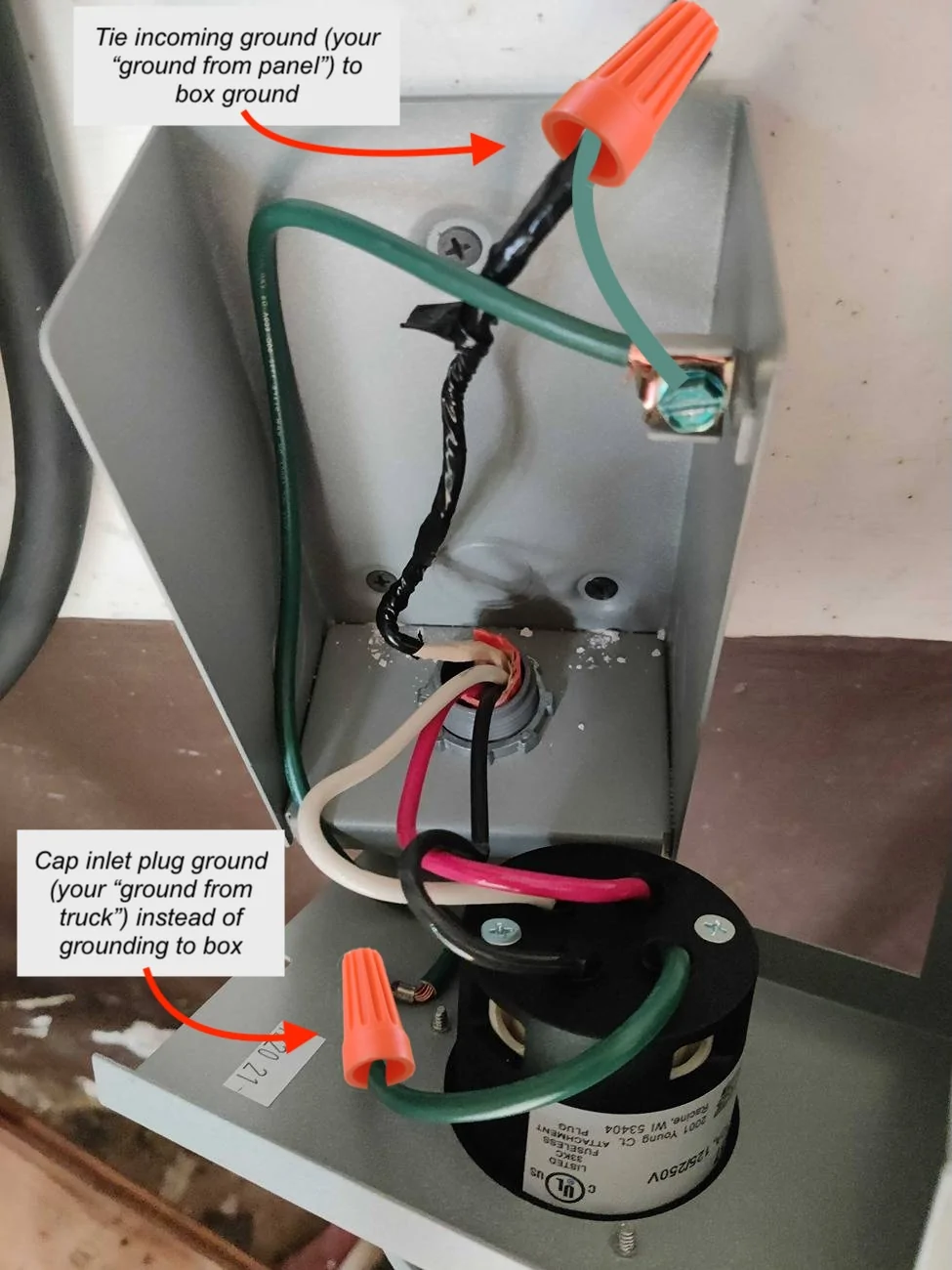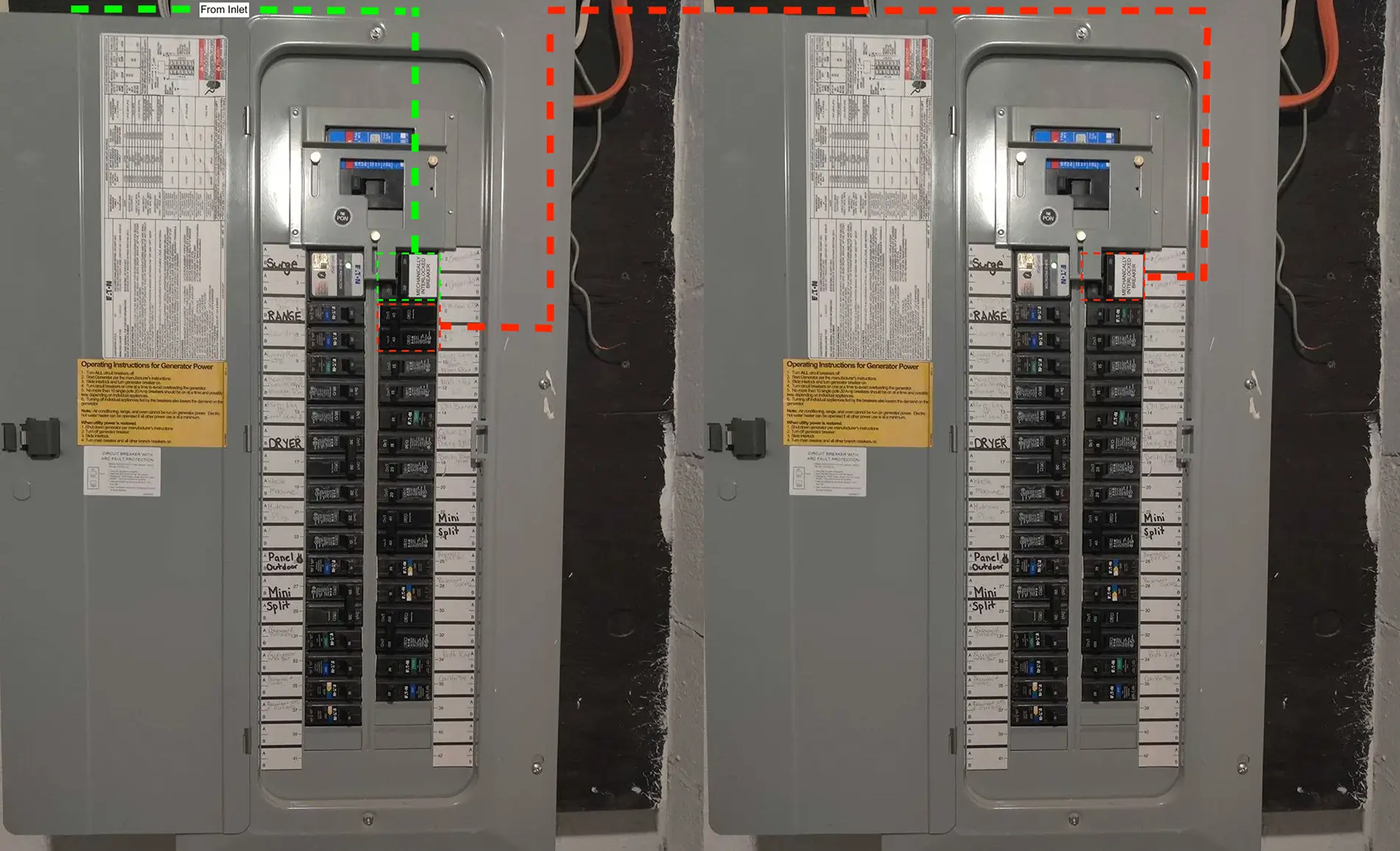Maquis
Well-known member
Current does not “return to earth.”The neutral is connected, the ground from the main panel is not. All current on the hot legs is returning to the earth via the main panel
Sponsored
Current does not “return to earth.”The neutral is connected, the ground from the main panel is not. All current on the hot legs is returning to the earth via the main panel
Wherever it goes, it uses the neutral to get thereCurrent does not “return to earth.”
100% agree. I mis-spoke, I said Nuetral but mean Ground. Inspector is coming this morning!I posted the drawing in post #101 to show the shock hazard should the neutral connection become disconnected (failed) from an ungrounded power source.
The attached photo shows an L14-30 plug which went open due to rough handling. Although this failure was on a line connection, the open circuit could have just as easily been on the neutral pin. Prior work experience, and this failure prompted my "Show some love to your L-14 Plugs" post on this forum.
Steve

This is my thought, which leads me to believe it's a very very extreme circumstance where you would actually get shocked. Almost like you would need to design a way or create a physical cut into the wire. Again, I'm dumb, so.....Wherever it goes, it uses the neutral to get there
Quick question about this. Couldn't you add an additional layer of safety by capping the "ground from truck" and tying the "ground from panel" to the point where you had the truck grounded (please see below picture for reference)? It would seem that if one of the hots came out of the back of your inlet and touched the box that it would be more likely to trip the breaker, rather than energize the metal box, if the box was tied to the incoming ground (in the event someone steps on/pulls the cord, bumps the box with the car, lawnmower, hand truck, etc., uses the inlet box as a step to reach something overhead....). I imagine there's a chance the truck wouldn't like this, but it seems like I've read about people modifying cords to not have a ground, so I'd think this would work. It's always possible I'm just wrong and this doesn't do anything safety-wise....Long story short (pun intended), the GFCI on the truck will trip off if the receptical ground wire is connected to the ground wire coming from the panel. So run all 4 wires from the panel to the generator plug and don't connect the green and connect the green from the truck side of the plug to the front of the plug and to the receptical hosing.
Because the generator (truck) is not connected permanently (ie for emegency use), it's legal (in a lot of states) for the ground to float.
One NOTE, I have one more thing to do before we call the inspector but the work was done with a permit and by a licensed electrician.


It really doesn’t matter. If a live wire were to contact the box, the GFCI will trip. It will never be energized.Quick question about this. Couldn't you add an additional layer of safety by capping the "ground from truck" and tying the "ground from panel" to the point where you had the truck grounded (please see below picture for reference)? It would seem that if one of the hots came out of the back of your inlet and touched the box that it would be more likely to trip the breaker, rather than energize the metal box, if the box was tied to the incoming ground (in the event someone steps on/pulls the cord, bumps the box with the car, lawnmower, hand truck, etc., uses the inlet box as a step to reach something overhead....). I imagine there's a chance the truck wouldn't like this, but it seems like I've read about people modifying cords to not have a ground, so I'd think this would work. It's always possible I'm just wrong and this doesn't do anything safety-wise....
Proposed Modification:

That makes sense. I guess, unlike an outlet, an inlet is not energized when not in use, and, because of the interlock, would never be receiving power from the utility.It really doesn’t matter. If a live wire were to contact the box, the GFCI will trip. It will never be energized.
That crossed my mind too and, as mentioned above, the box is GFCI protected by the truck when enegized so "toss a coin" so to speak. I guess if a circuit was leaking current to ground and/or the panel ground had a high impedence for some reason then having the panel ground isolated could prevent the input plug body from being hot maybe??That makes sense. I guess, unlike an outlet, an inlet is not energized when not in use, and, because of the interlock, would never be receiving power from the utility.
That might be one scenario where it could make a difference, but more likely I’m just inventing things to worry about.That crossed my mind too and, as mentioned above, the box is GFCI protected by the truck when enegized so "toss a coin" so to speak. I guess if a circuit was leaking current to ground and/or the panel ground had a high impedence for some reason then having the panel ground isolated could prevent the input plug body from being hot maybe??
Too much to know, too little time to learn it and too much information and misinformation available = too much to worry about.That might be one scenario where it could make a difference, but more likely I’m just inventing things to worry about.
Boy, isn’t that the truth.Too much to know, too little time to learn it and too much information and misinformation available = too much to worry about.
